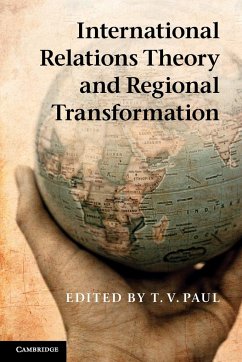Regional transformation has emerged as a major topic of research during the past few decades, much of it seeking to understand how a region changes into a zone of conflict or cooperation and how and why some regions remain in perpetual conflict. Although the leading theoretical paradigms of international relations have something to say about regional order, a comprehensive treatment of this subject is missing from the literature. This book suggests that cross-paradigmatic engagement on regional orders can be valuable if it can generate theoretically innovative, testable propositions and policy-relevant ideas. The book brings together scholars from the dominant IR perspectives aiming to explain the regional order issue through multidimensional and multi-causal pathways and seeking meeting points between them. Using insights from IR theory, the contributors offer policy-relevant ideas which may benefit conflict-ridden regions of the world.
Bitte wählen Sie Ihr Anliegen aus.
Rechnungen
Retourenschein anfordern
Bestellstatus
Storno


